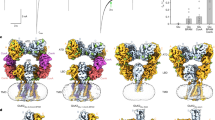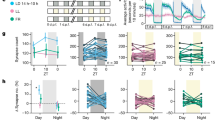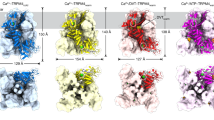Abstract
THE action of depolarising drugs on the endplate of skeletal muscle is difficult to interpret because the depolarisation is often transient and followed by spontaneous recovery during the continued presence of the drug, and because of differences between species. In frog muscle, depolarising drugs produce an initial increase in conductance at the endplate, followed by a decline in the conductance as ‘desensitisation’ develops1–3. In cat muscle, depolarisation is maintained while the drug is applied4. Rat muscle has long been considered anomalous in that the depolarisation is transient and limited5. We now report an unexpected finding for rat diaphragm, in which the recovery is attributed to the action of an electrogenic sodium pump6, stimulated by the entry of sodium.
This is a preview of subscription content, access via your institution
Access options
Subscribe to this journal
Receive 51 print issues and online access
$199.00 per year
only $3.90 per issue
Buy this article
- Purchase on Springer Link
- Instant access to full article PDF
Prices may be subject to local taxes which are calculated during checkout
Similar content being viewed by others
References
Manthey, A. A., J. gen. Physiol., 49, 963–976 (1966).
Jenkinson, D. H., and Terrar, D. A., Br. J. Pharmac., 41, 363–376 (1973).
Adams, P. R., Pflugers Arch. ges. Physiol., 360, 135–144 (1975).
Head, S. D., J. Physiol., Lond., 241, 102–103P (1974).
Thesleff, S., Acta physiol. scand., 34, 386–392 (1955).
Thomas, R. C., Physiol. Rev., 52, 563–594 (1972).
Creese, R., Mitchell, L., J. Physiol. Lond., 246, 44–45P (1975).
Creese, R., Franklin, G. I., Humphrey, P. P. A., and Mitchell, L. D., J. Physiol., Land., 254, 43–44P (1976).
Scou, J. C., Biochim. biophys. Acta, 42, 6–23 (1960).
Creese, R., Scholes, N. W., and Taylor, D. B., J. Pharmac. exp. Ther., 124, 47–52 (1958).
Terrar, D. A., Br. J. Pharmac., 51, 259–268 (1974).
Mooji, J. J. A., Evers, C. D. J., and Ras, D., Eur. J. Pharmac., (in the press).
Creese, R., Maclagan, J., J. Physiol., Lond., 210, 363–386 (1970).
Nedegaard, O. A., and Taylor, D. B., Experienta, 22, 521–522 (1966).
Creese, R., and England, J. M., J. Physiol., Lond., 210, 345–361 (1970).
Katz, B., and Thesleff, S., J. Physiol., Lond., 138, 63–80 (1957).
Rang, H. P., and Ritter, J. M., Molec. Pharmac., 6, 357–382 (1970).
Sugiyama, H. J. P., Eur. J. Biochem., 55, 505–515 (1975).
Creese, R., Scholes, N. W., and Whalen, W. J., J. Physiol., Lond., 140, 310–317 (1958).
England, J. M., J. Anat., 106, 311–321 (1970).
Author information
Authors and Affiliations
Rights and permissions
About this article
Cite this article
CREESE, R., FRANKLIN, G. & MITCHELL, L. Two mechanisms for spontaneous recovery from depolarising drugs in rat muscle. Nature 261, 416–417 (1976). https://doi.org/10.1038/261416a0
Received:
Accepted:
Issue Date:
DOI: https://doi.org/10.1038/261416a0
This article is cited by
-
Effects of carbamylcholine on membrane potential and Na-K pump activity of cultured rat skeletal myotubes
Cellular and Molecular Neurobiology (1988)
Comments
By submitting a comment you agree to abide by our Terms and Community Guidelines. If you find something abusive or that does not comply with our terms or guidelines please flag it as inappropriate.



